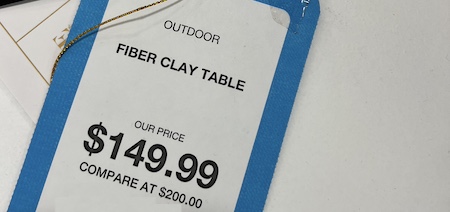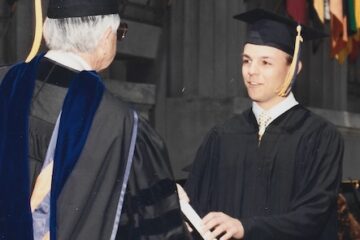Critical thinking in the little moments
I don’t believe we are living in a post-truth world. Yet. But there are definitely people trying hard to push us in that direction. And too many of us are all too happy to jump on the train they’re driving.
No, this is not a rant about politics or the possibility that the Free World might soon have a convicted felon in charge.
This is a post about the value of staying alert, keeping your mind open, and engaging your inner skeptic to avoid getting manipulated.
Certified Organic
Not long ago, I visited one of the farmers markets in Walnut Creek, California, where I used to live. The East Bay truly enjoys an abundance of natural goodness, and the farmers markets are robust and spectacular.
Strolling along the stalls, I noted the signs:
Certified Organic Produce. Certified Organic Produce. Certified Produce. Certified Organic Produce.
—– record scratch –—
Wait. Certified produce?

Exactly what was it certified for? Who certified that these carrots and tomatoes were, indeed, produce? I kind of felt like I would be qualified for that job, even though the green thumb in this family skipped my generation.
“Yup, these are vegetables, all right. Certified produce!”
I found myself in awe of the marketing genius behind that sign. Most people walking by will unconsciously insert the word “organic” into that phrase. They may buy produce from that farmer thinking it’s organic and never realize it’s probably not.
Our brains fill in the pattern.
Filling in the gaps
If my memory is correct, I first learned about a phenomenon called perceptual restoration from a guy named Jeff Hawkins. Jeff gave a speech at the company I was working for, Geoworks, in the mid 1990s around the time he founded Palm, Inc.
I don’t remember what Jeff said exactly, but while he was talking, he simply left a key word out of a sentence. He paused, then told us that he had intentionally left that word out. Most people in the room hadn’t noticed, even though that room held more brain power per capita than any room I’ve been in since.
Jeff then explained that the human brain is an exceptional pattern recognition device. Not only that, it also fills in missing information based on patterns has come to know. Thus, even though the word was never said, most of us in the room thought we had heard it.
I’m sure you’ve had conversations where you and the other party disagree about what had just been said, only moments before. And you get mad at each other because you just said it.
But it happens all the time. Someone says one thing, and the person they’re talking to hears an entirely different thing. Especially in environments full of distraction where the brain has too much going on and may need to fill in some things. Like while you’re driving.
The same thing happens in proofreading. The brain fills in words it expects to see, so typos and omissions and misspellings can persist through several rounds of proofreading, even into the final product.
For example, some of you caught that I left out “it” in the phrase “based on patterns it has come to know” above. Many of you will look back and be surprised to find it missing. That’s okay. It’s normal.
Verbal scaffolding
Remember how I said earlier this is not a post about politics? I’m going to mention Donald Trump, but I swear it’s not political.
Back before the 2016 presidential election, I watched the early Republican primary debates. It was a crowded field, and I was curious to see how they presented themselves.
I listened closely to Donald Trump at that time. And I concluded that through all his words—and there were a lot of words—he had said absolutely nothing.
Trump’s genius at the time lay in his ability to create verbal scaffolding, entirely void of actual substance. The audience then filled in the details with all the things they expected him to say.
This is how a Trump supporter and a Trump detractor can listen to the same speech and come away absolutely convinced that he said two completely different things. Whether you hate him or love him, the next time you listen to him speak, listen closely for actual substance as opposed to words that are left open to your own interpretation.
See? This isn’t a political post. It’s a post about attentiveness and self-awareness. The listener must be keenly aware of their own biases in order to understand how the speaker may be manipulating them.
It’s the same concept behind fridge magnet wisdom and paperweight wisdom.
Conceptual scaffolding
We fill in not just the sounds or the words our brains have come to expect, but also the meaning and intent.
The word organic was never on that sign at the farmers market. Even understanding that, we may be inclined to fill in intent: Well, they say certified produce and are at a farmers market, so they’re probably doing all the right things but just haven’t gotten their organic certification yet. I’m sure it’s just as good as the stuff in the next stall.
Even though there’s no factual basis to draw such a conclusion, we all do it. Whether you lean negative or positive, you fill in the gaps with whatever your brain has learned are the most likely patterns.
Compare at $200
I was reminded of these things over the weekend when I was at a store and saw an ugly end table priced at $150. It was really ugly and not particularly well made. You would expect it to cost $30, maybe. And even then you’d feel like you were being fleeced.
But below the price, the tag read, “COMPARE AT $200.”

Well, something that normally goes for $200 being sold for $150? That sounds good. I still won’t buy it because it’s ugly, but hey, this store has really good prices!
But… where does that $200 number come from? The tag didn’t say other retailers or original price. This was not a markdown.
It was just a suggestion that I compare $150 to $200.
The verbal scaffolding of “compare at,” combined with my pattern-matching expectation that a lower price means a discount, was working on me in subtle but important ways.
That fake comparison didn’t convince me to buy that table, but it did reinforce the company’s branding of having lower prices than other stores. And that might be influencing my other decisions as I’m shopping.
Practice truth in the small moments
A lot of people think they are hyper-focused on truth and fact when in reality they are easily manipulated by those who exploit their biases and known patterns.
In a world that is moving and changing faster than we can respond, with information and misinformation flooding our senses constantly, survival itself demands that we make tons of snap judgments on insufficient information.
Like any skill, however, discernment requires practice. When it comes time to use that skill in an important situation, you want it to be well developed and reliable.
If you’re a concert pianist, you practice. If you’re a public speaker, you practice. If you’re a professional athlete, you practice. All so that when it comes time to perform, you know you can rely on the skill you’ve worked so hard to develop.
Discernment is no different. This is why it’s important to look closely at things like signs at the farmers market and price tags on end tables.
Look for the flaws in the presentation. Look for the ways in which your inherent bias may be shaping your interpretation of the facts. Look for the gaps, and the ways in which your brain is filling in those gaps.
Then question whether those gaps were created intentionally, by whom, and for what purpose.
By practicing this skill in the small, quiet, trivial moments of life, you’ll build up your ability to be more objective when the big manipulations and misinformations happen.
And oh, they are happening all around you, all the time.
I can help
Looking to be a better leader? Contemplating a career change? Struggling with a big life question? Want to write or publish a book? Thinking about retirement?
I can help. Hit me up for a free coaching session now.



0 Comments